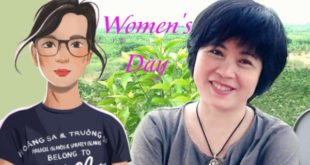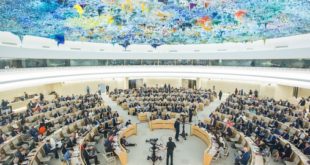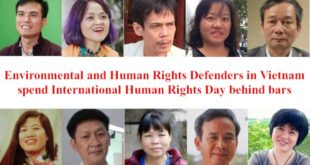NEW YORK, 15 January 2007 – Speaking before a panel of experts at the 37th Session of the Committee on the Elimination of Discrimination against Women (CEDAW), at the United Nations in New York today, Mr. Vo Van Ai, President of the Vietnam Committee on Human Rights and Vice-President of the International Federation for Human Rights (FIDH) expressed his grave concerns about persisting gender discrimination and violations of women’s rights in Vietnam. Mr. Ai presented the experts with a 32-page Shadow Report prepared by the Vietnam Committee on Human Rights on Vietnam’s implementation of the CEDAW Convention, which it ratified in 1982. Although state parties to UN Treaties have a binding obligation to submit reports every two years, Vietnam is submitting its fifth and sixth combined reports to the CEDAW Committee which are long overdue. Mr. Ai regretted that “Twenty-five years after Vietnam rafitied CEDAW, Vietnamese women are still not aware of their fundamental freedoms and rights”.
Whilst the Vietnamese government has made extensive legal commitments to protect women’s rights on paper, he said, these rights are not enjoyed in practice by women in Vietnam, especially in the social, economic and political domains. “Domestic violence, trafficking of women and girls, prostitution, the growing rate of HIV/AIDS amongst women, domestic violence and violations of reproductive rights are serious problems, yet they frequently go unacknowledged or unpunished by the authorities. This discourages women from denouncing abuses, and also sends the message that such forms of discrimination are socially acceptable in Vietnam”.
He observed that Vietnam’s policy of “doi moi” – economic liberalization under authoritarian control – has had an especially negative impact on women. Vietnamese women are exposed to new forms of violence, and the abolition of State subsidies on health and education has penalized women significantly, especially in the rural areas where 80% of the population live.
Under doi moi, trafficking for sexual exploitation has developed alarmingly, exacerbated by the rocketing wealth gap and official corruption. Sex rings are often run with the connivance of Communist Party officials, Security Police and the military, who are rarely brought to justice. According to government statistics, 70% of men using prostitutes are state officials, who finance their activities through government agency slush-funds. Vietnam has adopted Ordinance 10/2003/PL-UBTVQH11 to punish state employees found using prostitutes or protecting prostitution. However, the Ordinance provides for merely administrative, not criminal sanctions, which are decided by the State and Party hierarchy. The offenders’ families will not even be informed. Mr. Ai denounced such legislation as “totally ineffective”, adding that it “provides protection, rather than punishment” for Party and state officials.
Prostitutes, drug users and women infected with HIV/AIDS are classified as perpetrators of “social evils” and stigmatised by the regime. Prior to international gatherings (i.e. the SEA Games in 2003, the 2004 ASEM Summit or the APEC Summit in November 2006), the authorities launch campaigns to “sweep the streets clean” and arbitrarily detain prostitutes, homeless girls and street children in “Social Protection Centres” where they are subjected to deplorable conditions and deprived of all due process of law.
Hundreds of thousands of Vietnamese women and girls have been lured or trafficked a brides to Cambodia, China, Macau, Hong Kong, Laos, Malaysia, South Korea, Taiwan, Myanmar, Singapore, Thailand, Russia and the Czech Republic, and subjected to servitude or forced labour in appalling conditions. Women trafficked to China have been sold in remote areas to poor farmers who buy one “wife” to share between the whole village. “These women are treated like animals” said Vo Van Ai, citing reports in the official press : “Girls who try to run away have their tendons cut to prevent them from walking. Those who manage to escape are traumatized and permanently deranged”.
In its Shadow Report, the Vietnam Committee on Human Rights also highlighted the growing protest movement known as the “Victims of Injustice” (dan oan), mostly rural women, who gather in Mai Xuan Thuong Park in Hanoi. Every day, hundreds of expropriated women demonstrate peacefully in the park to protest offical power abuse, state confiscation of lands and other problems, desperately seeking to draw the attention of government officials and seek a solution for their grievances. In any cases, they are beaten and arrested by Police. Instead of seeking to solve their grievances, in March 2005, the Vietnamese government adopted Decree 38 prohibiting demonstrations outside public buildings. Mr. Ai stated that his Committee had received hundreds of appeals for help from “Victims of Injustice”, complete with photos and full case histories.
“Vietnam claims that poverty and the growing income gap are the main impediments to gender equality. But in fact, the real obstacle is Vietnam’s one-Party State, with its lack of transparency and political freedoms, and the pervasive control of the Communist Party of Vietnam (CPV)”, said Mr. Ai. In Vietnam today, there are no independent women’s civil society movements, no free trade unions, no free press, no independent judiciary. Vietnamese women’s unique representative is the Vietnam Woman’s Union, a para-governmental organization controlled by the Communist Party of Vietnam.
He concluded by calling on Vietnam to “initiate political reforms” and “create a climate of diversity and political pluralism so that all women may participate in the process of social, economic, intellectual and political development”. Specifically, he called on the Vietnamese government to authorize the establishment of independent women’s NGOs and civil society movements, a free press and free trade unions. Such institutions would provide “safety nets” to expose discriminatory practices and provide alternative mechanisms to protect women’s rights.
This post is also available in: French Vietnamese
 Quê Me Quê Me: Action for democracy in Vietnam & Vietnam Committee on Human Rights
Quê Me Quê Me: Action for democracy in Vietnam & Vietnam Committee on Human Rights




